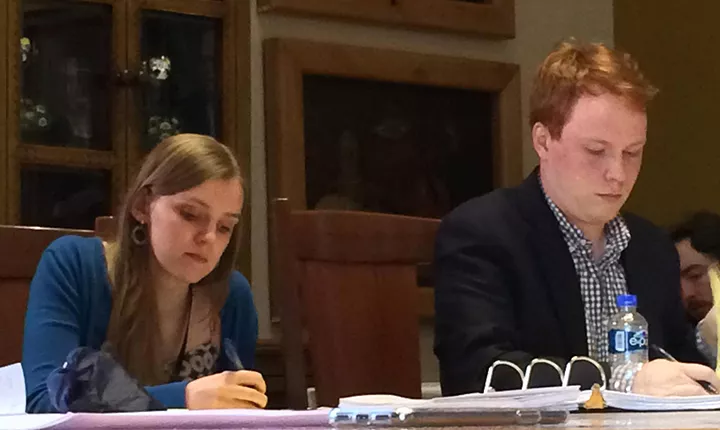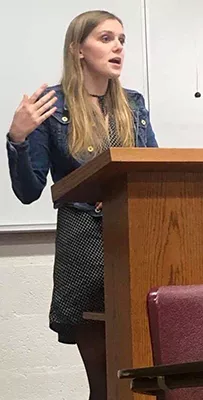Miriam Pierson ’18 and Nate Urban ’18 Named Debate Team of the Year

Pierson (left) and Urban are the fourth liberal arts college team to ever win Team of the Year and the first since 1998.
Building on an impressive streak of victories during the 2017 season, the Amos J. Peaslee Debate Society once again proved a debating powerhouse throughout the American Parliamentary Debate 2018 season.
Miriam Pierson ’18, an Honors economics and political science major from Arlington, Va., and Nate Urban ’18, an Honors political science major from Westtown, Pa., ended the season as Team of the Year. Pierson also clinched Speaker of the Year and Malcolm Davis ’21, of Wellesley, Mass., was ranked fourth-place Novice of the Year.
In her debate career, Pierson has won Novice of the Year, Speaker of the Year, Team of the Year, and Nationals — and she is the first person in the history of the league to win all of these awards and the first woman to win both Speaker and Team of the Year. Pierson and Urban are the fourth liberal arts team ever to win Team of the Year, the first since 1998, and the first Swarthmore team to do it since 1987.
“It was actually a little bit stressful going into this year because Team of the Year is a big commitment to go after,” says Urban. “A lot of top teams will research your strengths and weaknesses and write up topics specifically to attack them — as well as being a major year-long time commitment. Last year gave us a lot of confidence heading into this year, and confidence is half the battle.”
Pierson and Urban have competed everywhere from Oxford to Mexico City, although they primarily compete at different universities across the United States. This winter, they advanced to the elimination rounds at the World Debate Championships, the first time Peaslee has done so in 10 years.
“The number one thing that has helped Nate and me improve a lot this year has been having a very talented team of younger debaters to practice against,” says Pierson. “The best way to improve at debate is to practice against people who can think creatively and challenge you with interesting arguments you haven't thought of before.”

Pierson is the first debater in league history to win Novice of the Year, Speaker of the Year, Team of the Year, and Nationals in a career.
“Once our freshmen and sophomores get a bit more experienced,” Pierson adds, “I think they will be a force to be reckoned with in the league!”
This year, Pierson and Urban have debated a number of interesting topics, including whether the U.S. government should break up Google using anti-trust laws, whether South Africa should seize and redistribute land from white South Africans to Black South Africans, and whether employers should be banned from firing employees for political or speech acts.
Pierson notes that the Stanford tournament was particularly exciting for her because her dad and sister came out to watch the elimination rounds. This tournament included a tight semifinal round against Harvard in a debate regarding whether Mexico should dramatically change its approach to combating drug trafficking.
“That was a great topic as we have both taken [William R. Kenan Jr. Professor of Political Science] Ken Sharpe's seminar on Latin American Politics,” says Pierson. “I know my family was very proud to see me excelling at an activity they know I'm very passionate about.”
Pierson also cites the American University tournament as an important competition for her and Urban. This tournament was a case tournament, meaning that the team got to choose its own topic. For the final round, they used a case that Pierson wrote when she was a freshman about the extent to which LGBT rights groups can and should work with the Republican Party. She recalls that American was the first tournament she and Urban ever competed in together when he joined the team his sophomore year; although they made it to the final round that year, they were ultimately defeated.
“It was fun to come back and finally win a final round at American using the first debate case I wrote as a freshman,” says Pierson.
Pierson and Urban will graduate leaving a strong team of younger debaters to carry on Peaslee’s legacy. In addition to Davis, Sarah Wheaton ’21, of St. Paul, Minn., ranked within the top 20 novices for the 2018 season.
“Debate has helped me to formulate arguments and has taught me to really value discussion between people,” says Urban, who will be working in Pennsylvania politics after graduation. “I think part of the reason I want to work in politics is because of the dichotomy between what the American political landscape looks like in terms of communication, and how well I've seen communication go in debate.”
Pierson also credits her experience with debate as influencing her post-graduation plans, although she is not yet certain what she will be doing.
“Before I started debating, I was nervous about even asking questions in class and very uncomfortable with public speaking,” she says. “In some ways, I think debate is most important for people who feel it doesn't come naturally to them, because it forces you out of your comfort zone. Learning how to speak in front of an audience in high-stakes situations has also made me far more comfortable presenting for class or even speaking up as an intern when I have an idea.”



